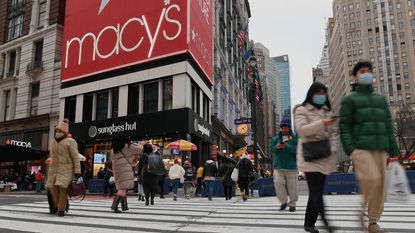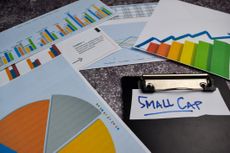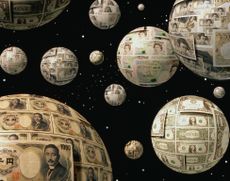US stockmarkets shrug off the mob's rampage through the US Capitol building
US stockmarkets seem more interested in the results of Senate elections in Georgia than on the lawless mob's raid on the country's Capitol building.

A “lawless mob” storms the US Capitol in a bid to overturn a democratic election, says Michael Mackenzie in the Financial Times. How did “cold-blooded markets” react? After a “brief wobble” they decided to set new all-time highs. Investors are more interested in Georgia, where Democrats last week gained control of the US Senate. That should give the Joe Biden administration more scope for further stimulus measures, helping the current “reflation” stock rally run hotter.
The expectation of new stimulus measures has continued to push up yields on ten-year treasury bonds – the benchmark of America’s borrowing costs – which this week hit a ten-month high. Signs that the US economy began to lag at the end of last year have given the stimulus doves another boost. The country shed a net 140,000 jobs in December, the first decline in seven months. The fall was driven by layoffs in the hospitality sector, which has been hit hard by the country’s post-Thanksgiving virus wave.
The latest jobs numbers follow weaker consumer spending and confidence data, economist Stephen Roach told CNBC. The “V-shaped recovery” is “in tatters” but traders don’t “seem to care”. They are betting that bad news will simply prompt the Federal Reserve to keep interest rates lower for longer. Thanks to loose money, markets feel they can ignore everything from a “double-dip” to “political insurrection”.
Subscribe to MoneyWeek
Subscribe to MoneyWeek today and get your first six magazine issues absolutely FREE

Sign up to Money Morning
Don't miss the latest investment and personal finances news, market analysis, plus money-saving tips with our free twice-daily newsletter
Don't miss the latest investment and personal finances news, market analysis, plus money-saving tips with our free twice-daily newsletter
Markets are used to economic data, but they are a poor judge of a society’s democratic health, says Greg Ip in The Wall Street Journal. Venezuelan markets rallied for years as Hugo Chavez consolidated power. Only when inflation surged and the economy crashed did they realised how many key social institutions had been destroyed. Deep polarisation is emerging as a long-term threat to US economic vitality. Investors should pay attention.
-
 Private school fees soar and VAT threat looms – what does it mean for you?
Private school fees soar and VAT threat looms – what does it mean for you?Rising private school fees could see more than one in five parents pull their children out of their current school. Before you remortgage, move house or look to grandparents for help, here’s what you need to know.
By Katie Williams Published
-
 Best and worst UK banks for online banking revealed
Best and worst UK banks for online banking revealedWhen it comes to keeping your money safe, not all banks are equal. We reveal the best and worst banks for online banking when it comes to protecting your money from scams
By Oojal Dhanjal Published
-
 AstraZeneca CEO’s £1.8mn pay rise approved despite shareholder opposition
AstraZeneca CEO’s £1.8mn pay rise approved despite shareholder oppositionAstraZeneca hiked its dividend to persuade shareholders to accept CEO Pascal Soriot’s pay rise. Is he worth his salary?
By Dr Matthew Partridge Published
-
 Adidas, Nike or Jordans - could collectable trainers make you rich?
Adidas, Nike or Jordans - could collectable trainers make you rich?The right pair of trainers can fetch six figures. Here's how you can start collecting vintage Adidas, Nike or Jordans now
By Chris Carter Published
-
 The industry at the heart of global technology
The industry at the heart of global technologyThe semiconductor industry powers key trends such as artificial intelligence, says Rupert Hargreaves
By Rupert Hargreaves Published
-
 Three emerging Asian markets to invest in
Three emerging Asian markets to invest inProfessional investor Chetan Sehgal of Templeton Emerging Markets Investment Trust tells us where he’d put his money
By Chetan Sehgal Published
-
 What to consider before investing in small-cap indexes
What to consider before investing in small-cap indexesSmall-cap index trackers show why your choice of benchmark can make a large difference to long-term returns
By Cris Sholto Heaton Published
-
 Why space investments are the way to go for investors
Why space investments are the way to go for investorsSpace investments will change our world beyond recognition, UK investors should take note
By Merryn Somerset Webb Published
-
 Time to tap into Africa’s mobile money boom
Time to tap into Africa’s mobile money boomFavourable demographics have put Africa on the path to growth when it comes to mobile money and digital banking
By Rupert Hargreaves Published
-
 M&S is back in fashion: but how long can this success last?
M&S is back in fashion: but how long can this success last?M&S has exceeded expectations in the past few years, but can it keep up the momentum?
By Rupert Hargreaves Published